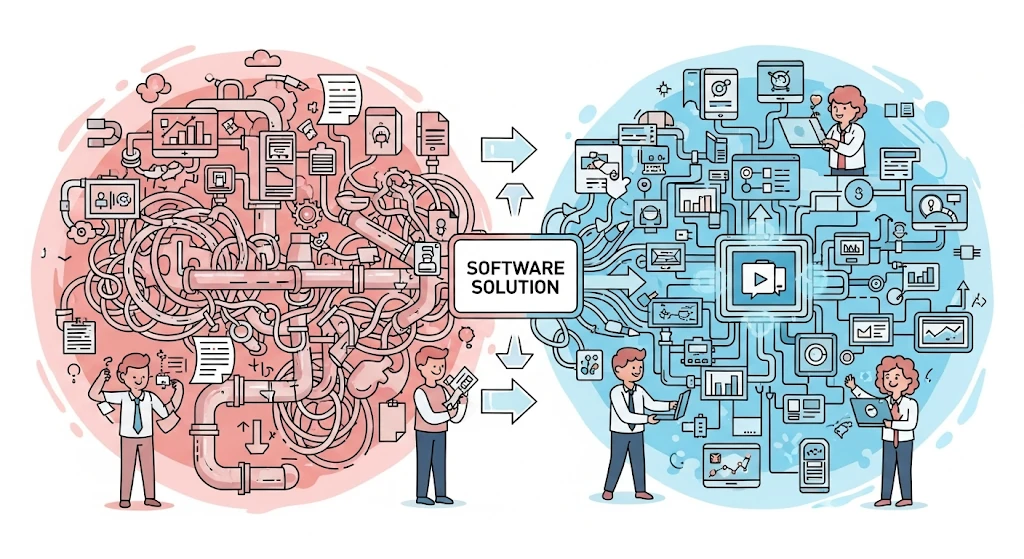
The software vendor is one of the most basic threads in the complex web of the modern digital world that can be frequently disregarded. The software vendors are the unseen designers who build a team of your operating system, which you see when your computer boots up, and the intricate resource planning (ERP) system that your global corporation uses to operate its logistics. But just what are they, and why does practically every organization, maybe a single-person startup or a government agency, have to depend on them?
The definition of the software vendor
A software vendor is an individual or business which develops, creates, and sells software products or services. The term is very wide and it involves a whole spectrum of entities. It can refer to:
- Industry Giants: Behemoths of publicly traded firms such as Microsoft, Oracle, and Salesforce, which provide a full suite of software.
- Niche Players: Smaller firms that serve a niche market, like dental practice management software or construction project tracking software.
- Open-Source Foundations: The Apache Software Foundation and other organizations like the Linux Foundation are organizations that supply important software, which is free to use, although in many cases under the provision of paid services.
- Individual Developers: A single programmer selling a mobile application in the Google Play Store or in the App Store of Apple is fundamentally a software seller.
The essence of a vendor is not only to develop software but also to package, sell, distribute, and service. They take care of the whole lifecycle of a software product.
The Breaking Down: The Convincing Reasons to Use Software Vendors

The reasons why companies prefer to buy software instead of developing it are multifold both in terms of strategy and in terms of practice. This is commonly known as “buy vs build” and it is an important decision every business leader has to make.
1. Cost Effectiveness and Foreseeability
In-house software development is not cost-effective. It involves hiring, recruiting and retaining a group of highly qualified (and highly paid) developers, project managers, UX/UI designers and quality assurance testers. In addition to the salaries, hardware, infrastructure, and continuous training are also expensive.
A seller on the other hand passes the colossal cost of development to the entire range of customers. This enables them to sell the software at a fraction of the price of creating one, usually in a predictable subscription (SaaS) or perpetual license business model. This transforms a big and erratic capital expenditure (CapEx) into a small, predictable operational cost (OpEx).
2. Availability of Professional Competence and Research

The software vendors are gurus in their field. A furniture-making company is not a writer of code to write supply chain analytics but rather an expert in design and woodworking. Using the product of a vendor, that furniture company can immediately access the knowledge of world-class software and the most recent technological advancements such as artificial intelligence, machine learning, or blockchain that would otherwise not be attainable internally. Vendors do spend heavily on their research and development in an attempt to remain competitive and the customer is the ultimate beneficiary of such developments.
3. Specialize in Core Business Competencies
This is probably the greatest reason. Energy and resources of a company are limited. Outsourcing software requirements that are not core to their operation to a vendor allows the leadership and employees to concentrate on what they are good at, which is innovating within the industry where they are providing the services to their clients and expanding their business. Construction and support of a tailored CRM is a huge diversion for a marketing agency that specializes in designing campaigns. With Salesforce or HubSpot, they will be able to concentrate on their clients.
4. Quick to Market and Fast Implementation
A good, secure, and scalable software requires time and can take many years to develop. That is a luxury few can afford in the current fast-paced business climate. A vendor is offering a solution that is ready to use and can be implemented and set up within weeks or months rather than years. This is the speed, which enables businesses to react fast to the market opportunity, have a competitive advantage and address the operational inefficiency without wasting any more time.
5. Compliance, Reliability and Security
Software vendors with reputable backgrounds use tremendous resources in making their products reliable, secure, and in line with industry regulations. They have also allocated security teams to fix vulnerabilities, extensive infrastructure to ensure that their systems are always online (usually with 99.9% SLAs), and legal professionals to make sure that their software is of acceptable quality, such as GDPR, HIPAA, or PCI-DSS. This degree of confidence when using an in-house team is insanely hard and costly for a non-technical company.
6. Scalability and Support
With the expansion of a business, its software must also expand. Vendor solutions are put up in a manner that they can be scaled with ease be it the addition of more users, increased processing of data or a new territory. Moreover, vendors can offer essential support services such as help desk, knowledge base, training and troubleshooting, which removes the internal IT team from maintaining another system.
The Transforming Landscape: Services to Products
With the introduction of cloud computing, the work of the software vendor has undergone a massive transformation. The old model was the selling of a continuous license of a software pack (e.g., Microsoft Office 2019) installed on premises. The dominating model nowadays is the Software-as-a-Service (SaaS). The software application is now hosted and managed by vendors in the cloud and can be accessed by customers using a web browser at a recurring subscription fee.
This is the change that has made the vendor-customer relationship more of a partnership. The vendor keeps on updating the software, introducing features, and providing security, making the product undergo continuous improvement and not be a fixed product. The model is even more valuable, predictable and flexible to the user.
Potential Discussion and Problems
Although the advantages are evident, using the vendors of the software is not a consideration-free exercise:
- Vendor Lock-in: It can be hard and expensive to move data and processes out of one vendor system to another system, and this creates a dependency.
- Minimal Customization: Off-the-shelf software might not be an ideal fit for all unique business processes, but most vendors do provide extensive configuration facilities.
- Security and Data Privacy: It is due diligence to entrust sensitive data to a third party. It is important to screen the security practices of the vendor and the data governance policy.
- Ongoing Costs: Subscription fees are predictable but recurrent costs, therefore, increasing over time and they might surpass a one-time cost of an old perpetual license.
Conclusion
Software vendors cannot only be described as sellers of non-tangible products, but they are also facilitators of innovation and efficiency. They make powerful technology democratically available to all businesses to enable the businesses of all sizes to compete and survive in the digital age. The buy or build decision is a tactical decision that exploits the specialization, cost management and enables organizations to pursue their real mission. When selecting the appropriate vendors, businesses are not merely buying software but rather they are selecting the strategic alliance that will assist in shaping their future prosperity.
FAQs
Q. What is meant by independent software vendor (ISV)?
An Independent Software Vendor (ISV) is a business that develops and markets software to operate on a single or multiple computer hardware or operating system platforms regardless of the vendor of that platform.
Q. What are the reasons why companies would buy rather than build software?
Software purchase is more convenient, cheaper, and trustworthy. The vendors offer experience, frequent updating, and scalability, which most companies cannot do cost-effectively internally.
Q. What is software vendor lock-in?
Vendor lock-in is when a company is extremely reliant on the product or ecosystem of one vendor such that changing to a different vendor is extremely difficult or potentially expensive.
Q. What is the source of income of software vendors?
They usually generate income by licensing (perpetual or subscription), Software-as-a-Service (SaaS) subscriptions, support and maintenance or premium add-ons.
Q. Do open-source software vendors qualify as vendors?
Yes, indeed, organizations such as the Apache Software Foundation or Red Hat are software vendors although they offer EO solutions. They usually earn revenue in the form of support, customization and enterprise services.
Q. How do SaaS vendors differ from traditional software vendors?
The old vendors offer offline perpetual licenses which are installed locally. SaaS providers offer cloud-based software that is available through subscription, and it is updated and supported.
Q. How can I avoid vendor lock-in?
Businesses can avoid lock-in risks by selecting vendors that help reduce risks, that offer portability of data, and that are explicitly defined in contracts.
